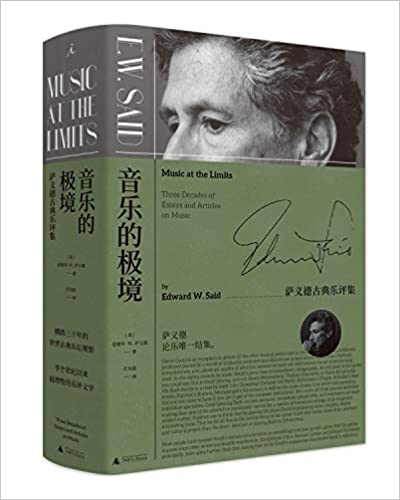WULOLIFE
《音乐的极境》副标题: 萨义德古典乐评集 作者: [美]爱德华·W.萨义德 出版社:广西师范大学出版社 出品方: 理想国
《音乐的极境》副标题: 萨义德古典乐评集 作者: [美]爱德华·W.萨义德 出版社:广西师范大学出版社 出品方: 理想国
Couldn't load pickup availability
Description
内容简介 · · · · · ·
从古尔德、波利尼、布伦德尔,到普莱亚、席夫、鲁普;从切利比达克,到巴...
抽绎音乐的社会、政治、文化脉络,阐释音乐对社会被Description:
把要价过高的噪音推到最大;
霍洛维兹成了在白宫接受颂扬的国有资产;
文的指挥简直就像是从坟墓里挖音乐,而不是赋予音乐生动与活力
纽约大都会歌剧院只甘于上演老实平庸的二流剧目;
萨尔兹堡音乐节僵化成例行公事和恬不知耻的观光促销计划……
作者简介 · · · · · ·
作者:
萨义德(Edward W. Said, 1935—2003,美国文学理论家与批评家,哥伦比亚大学英国文学与比较文学教授,其撰文与观点屡见于各大报纸杂志,在当今世界具有广泛世界影响力。为《国家民族政坛杂志》撰写音乐专栏多年。代表作有:《东方学》(Orientalism)《文化与帝国主义》(Culture and Imperialism)《从奥斯陆到伊拉克以及路线图》(From Oslo to Iraq and the Road Map)《权力、政治与文化》(Power, Politics, and Culture: Parallels and Paradoxes: On Late Style
译者:
庄加逊,毕业于上海交通大学,外国文艺理论硕士,翻译、作家。译作包括《古尔德读本》(The Glenn Gould Reader: Why Mahler? 著)、《亲爱的阿尔玛》(Gustav Mahler: Letters To His Wife:著)。著有《陌上花来:回归与远行》。
目录 · · · · · ·
序 /vii
致谢 /xiii
第一部分 1980 年代
第一章 音乐本身:古尔德的对位法洞见 /003
第二章 追忆演奏年华:钢琴家的艺术风采与记忆 /018
第三章 威仪堂堂音乐节 /039
第四章 从理查·施特劳斯说起(续谈音乐节) /050
第五章 《女武神》《阿依达》与《X》 /062
第六章 音乐与女性主义 /074
第七章 万人迷大师(评《理解托斯卡尼尼》) /083
第八章演奏家:人到中年 /090
第九章 维也纳爱乐:贝多芬交响曲及协奏曲全集 /098
第十章 《塞维利亚理发师》与《唐璜》 /107
第十一章 古尔德在大都会博物馆 /117
第十二章 《朱利奥·恺撒》 /124
第十三章 《蓝胡子城堡》与《期待》 /133
第十四章 极致瞬间:切利比达克 /141
第十五章 彼得·塞拉斯的莫扎特 /149
第十六章 席夫在卡内基 /155
第二部分 1990年代
第十七章 理查·施特劳斯 /165
第十八章 瓦格纳和大都会的《指环》 /177
第十九章 聊聊歌剧制作 /193
第二十章 风格与无风格 /206
第二十一章 布伦德尔:乐文 /217
第二十二章 《死城》《费德里奥》与《克林霍夫之死》 /222
第二十三章 风格的不确定性 /237
第二十四章 音乐的回望 /252
第二十五章 巴德音乐节 /265
第二十六章 论“对瓦格纳不忠”的重要性 /281
第二十七章 乐之姿态(论索尔蒂) /297
第二十八章 《特洛伊人》 /308
第二十九章 儿戏 /320
第三十章 《关于古尔德的三十二个短篇》 /330
第三十一章 巴赫的天才,舒曼的怪癖,肖邦的无情,罗森的天资 /335
第三十二章 为什么要听布列兹? /348
第三十三章 欣德米特与莫扎特 /358
第三十四章 评坦纳新著《瓦格纳》 /366
第三十五章 椅中人 /371
第三十六章 谈《费德里奥》 /386
第三十七章 音乐与场面 /408
第三十八章 评戈特弗雷德·瓦格纳的《我的自传》 /416
第三十九章 大众的巴赫 /421
第三部分 2000年以后
第四十章 巴伦博伊姆(跨文化联结) /433
第四十一章 古尔德,作为知识分子的艺术大师 /443
第四十二章 抗怀宇宙 /464
第四十三章 巴伦博伊姆与“瓦格纳禁忌” /483
第四十四章 不合时宜的冥思 /497
附录巴赫/贝多芬 /510
